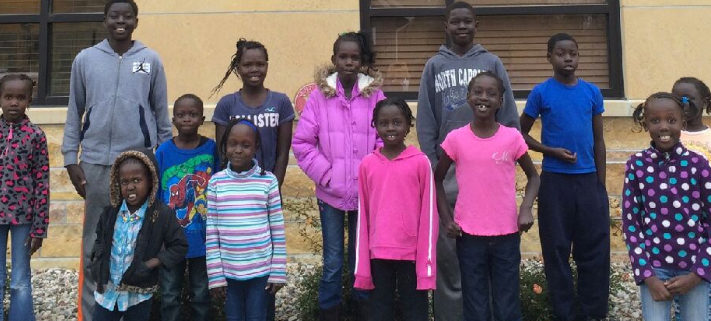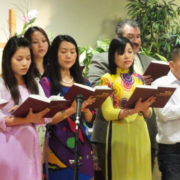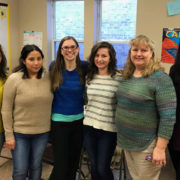Reaching Out to the Sudanese: Providing a Christ-Centered Home away from Home
Rachel Hartman
In 2003, “We had just built an addition to our church,” recalls Keith Siverly, who serves at St. Mark in Mankato, Minn. “Two boys rode by. They were both on one bike and I said, ‘I hope you don’t have to travel far.’”
The boys responded by saying, “We want to join your church.”
The two children rode away on their bikes, but returned a little while later with a van full of people, including their mother. The parents were originally from South Sudan, and had come to the United States as refugees. After settling in the area, they were interested in a place where they could worship and where their children could receive a Christian education.
The family with the two boys who had first greeted Siverly on bikes soon became members of the congregation. During the coming years, other families with a South Sudanese background learned of the church as well. “It’s grown over the years,” remarks Siverly. “We now have 15 South Sudanese students in our grade school out of 93 students, and 38 members of our church who are South Sudanese.”
Ministry to the Sudanese
In addition to Minnesota, refugees from the Nuer tribe who have fled from South Sudan are living in other parts of Africa and beyond. After leaving due to civil unrest, these individuals and families have stayed in refugee camps and gone through long processes to come to countries such as the United States and Canada.
Pastor Peter Bur is one of these refugees. Originally from South Sudan, Bur came to Omaha, Nebraska, and began worshipping at Good Shepherd in 2010. At the time, he was serving as a spiritual leader for Sudanese immigrants. Bur enrolled in the Pastoral Studies Institute (PSI), which is offered through Wisconsin Lutheran Seminary in Mequon, Wis. The PSI guides non-traditional students through pre-seminary and seminary training.
Bur graduated in 2015, and now works with a group of about 55 South Sudanese in Omaha. He helps coordinate the pastoral training of other South Sudanese in both North America and refugee camps in Africa. He has also continually sought ways to connect Sudanese immigrants throughout the United States and Canada with WELS congregations in their area.
One of the men Bur encouraged to find a WELS church had settled in the Calgary, Alberta area. “In 2013, a Sudanese man came to our church,” says Pastor Mike Vogel, who serves at St. Paul in Calgary. “He had the names of three WELS churches scrawled on a piece of paper. He had heard of us through Peter Bur.”
The man brought one family after another to the congregation. “We now have 50 that we serve,” explains Vogel.
Meeting language needs
Those arriving from South Sudan generally speak the Nuer language, but as families settle in North America, English enters into their homes and becomes the predominant language for their children.
“The first generation who are here were in refugee camps and then came here,” explains Siverly. “Those who are 18 and under – all the kids we have in the school – were born in the United States. The children often can speak the language of Nuer but can’t read it. The parents can frequently speak English but have trouble reading it.”
The group in Mankato meets once a month for a service in the Nuer language. “We realize on a local level there’s a value in meeting and having a service in your own language,” says Siverly. “They are usually three-hour services, and they are very uplifting for them.”
At Lincoln Heights in Des Moines, Iowa, a group of about 15 adults are confirmed members, and these individuals attend along with their children. “Our goal is to train another Sudanese leader for that group who can speak their language,” notes Pastor Matt Pfeifer, who serves the congregation. “Right now we use sermons from Pastor Peter Bur in Omaha. He sends them to the men in the congregation to read in their language.”
Serving with open arms
At Risen Savior, the grade school connected with St. Mark in Mankato, the Sudanese are appreciative of the opportunities for their children. “Parents are very much into family and Christian education and that’s a key for us,” explains Siverly. “We are known in the community as a place that can help you.”
The ministry reaches to a personal level as well. “There are struggles when you first come to a country,” notes Siverly. “I try to go to basketball games, dentist appointments and other things they need help with.”
Some children have gone on to attend Minnesota Valley Lutheran, a high school in the area, after graduating from Risen Savior.
At St. Paul in Calgary, the congregation has welcomed the Sudanese families along with other members from different cultural backgrounds. “We worship all together,” says Vogel. “We integrate with them and feel like they are part of our church.”
Reaching near and far
“Seattle has become sort of a gateway for the Sudanese,” points out Joel Hoff, pastor at Divine Peace in Renton, Wash. The congregation serves a group of Sudanese immigrants. “Twice a month they have Nuer services in the afternoon and the members will join us for worship and commune twice a month. It’s helping our congregation as we enjoy the blessing of world missions at our doorstep.”
They are also looking at ways of serving others in different areas. “Two of our members are involved in Kingdom Worker efforts,” adds Pfeifer. They are scheduled to help carry out health-related workshops and also evangelism opportunities to refugees in Ethiopia. “We do local ministry here, but the first-generation Sudanese are very focused on helping friends and families in refugee camps. Their mind always goes back to Africa.”
Rachel Hartman and her husband, Missionary Michael Hartman, serve in Leon, Mexico.
Meet the Omit Family
Teresa Omot is the mother of Cham, who graduated from Minnesota Valley Lutheran High School in 2016. Her son Dunwa currently attends high school there, and her other four children go to Risen Savior Lutheran School in Mankato, Minn.
Teresa recalls her journey from a village in Sudan to Ethiopia to a refugee camp in Kenya to America and eventually to the halls of Risen Savior and MVL. Jakoni, Teresa’s husband, emigrated from Ethiopia to America to forge a new life for them. Upon his arrival, he initially found work at a hotel for $6.00 an hour. Every month he sent $100.00 to Teresa so she could support her family. It took three years of bureaucratic red tape before Teresa received permission to join Jakoni in America.
And when the closure of the Fargo meat-packing plant at which Jakoni was working prompted a move to Mankato, the family came into contact with St. Mark Lutheran Church in Mankato. They soon became members and enrolled their children in the Christian education programs offered there. To listen to Teresa is to listen to a mother speak of the joy and peace her children experience daily through their Christ-centered education. She relays the priority she and Jakoni place on Christian education for all six of their children.
Pastor Keith Siverly serves at St. Mark, Mankato, Minnesota.
SUBMIT YOUR STORY
Do you have a manuscript, idea, or story from your own life you’d like to share for use in Forward in Christ or on wels.net? Use our online form to share it to our editorial office for consideration.
SUBSCRIBE TO FORWARD IN CHRIST
Get inspirational stories, spiritual help, and synod news from Forward in Christ every month. Print and digital subscriptions are available from Northwestern Publishing House.
Author: Rachel Hartman & Keith Siverly
Volume 104, Number 6
Issue: June 2017
Copyrighted by WELS Forward in Christ © 2021
Forward in Christ grants permission for any original article (not a reprint) to be printed for use in a WELS church, school, or organization, provided that it is distributed free and indicate Forward in Christ as the source. Images may not be reproduced except in the context of its article. Contact us





